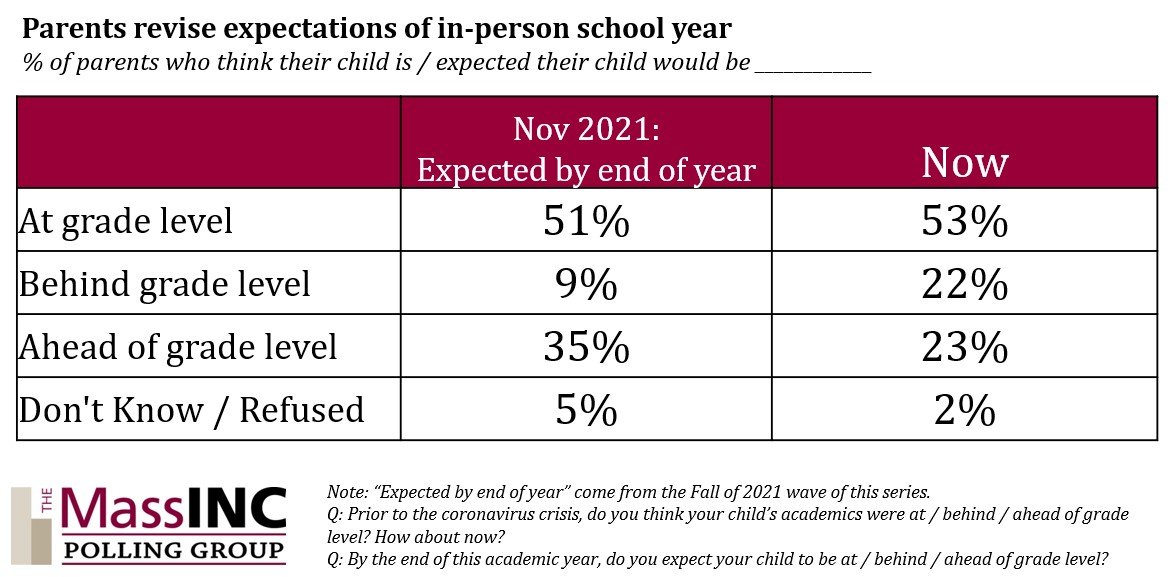New K-12 Parent Poll: Student mental health, academics pose challenge to Massachusetts schools COVID recovery plans
Health risks remain a concern for parents; majorities support ongoing mitigation measures.
The COVID-19 pandemic is not over, and neither are its impacts on academics and mental health. That’s the view of Massachusetts K-12 parents according to a new statewide poll released today by The MassINC Polling Group. The pandemic brought long lasting academic and mental health concerns, which parents say remain serious challenges today. The poll also found 48% of parents remain at least somewhat concerned about their child getting infected at school, with majority support for testing programs and other mitigation measures.
That’s according to the sixth in a series of surveys of Massachusetts parents released today. The series began in Spring 2020, and has been made possible by support from The Barr Foundation. The results will be discussed at a virtual event from 11 AM - Noon, March 3, 2022. Registration is free and the event is open to the public.
About half (48%) of Massachusetts parents are at least somewhat concerned with their children’s mental health. That’s down from 60% in the survey wave conducted in February 2021. Help for these children with mental health challenges has been spotty. Among parents concerned about mental health, just 48% say they were offered help by the school.
Earlier this school year, parents were optimistic that in-person schooling would help their children catch up. But poll results released today shows that 22% of parents believe their children are still behind grade level. That’s unchanged since the October 2021 survey wave, and far more than thought so pre-pandemic. Among parents who believe their kids are behind, 62% think schools should be doing more than they are to help students catch up. When asked what would be most useful, parents cited the need for a range of academic and classroom supports.
Mental health concerns are very often intertwined with academic hurdles. In all, 74% of parents who see their children as behind grade level also reported mental health concerns, far higher than parents of those with fewer academic challenges (41%). Mental health concerns were also greater among parents of English learners (63%) and students with IEPs (61%).
Even as classroom challenges persist, the poll reveals sharp differences in how parents view the pandemic itself. About half (52%) say we should “we should accept more risk in general so our children can have full experiences in school and activities,” while 40% believe “we should generally limit risk so our children are better protected from infection.” The more risk tolerant view is most prevalent among white (56%), Asian American (57%), and upper income parents (58%). Others are less likely to share this view including Latino parents (37%), Black parents (42%) and those in lower income households (37%).
Black parents are most concerned about infection at school, with 69% somewhat or very concerned compared to 45% of white parents. Across race groups, lower income parents are more concerned about infection than are upper income parents.
Risk tolerance and infection concerns contribute to wide gaps in how parents see COVID mitigation measures. For example, 80% of Black parents supporting a mask mandate, compared to 50% of white parents. White parents express more support free rapid tests (85%), and the “test and stay” program (79%) that many districts have implemented than they do other measures. Asian American parents support the full range of mitigation measures, with at least 70% support for each. Two thirds or more of Latino parents are on board with each measure other than a student vaccine mandate.
The poll finds vaccination rates are lagging, particularly among younger and lower income children, matching the contours of official state statistics. Rates are also lower in some rural areas and in Gateway Cities. Areas with lower vaccination rates remain at greater risk of health impacts and future school disruptions. Vaccination mandates are less popular than other mitigation measures, with 61% support for a teacher / staff vaccine mandate and 54% for students.
About the poll: These results are based on a survey of 1,469 parents of K-12 students in Massachusetts. Live telephone interviews and online interviewing were conducted in English and Spanish from March 17 – April 11, 2022. Telephone respondents were reached by both landline and cell phone. Oversamples of Black, Latino, and Asian respondents were obtained to bring the total interview count up to at least 250 for each group for the base sample. Results within race and ethnicity were weighted to age, gender, geography, and education level for each group. Groups were then combined and weighted to the population parameters by race for the state as a whole. The poll was sponsored by The Barr Foundation with major project input and assistance from the Education Trust..
About The MassINC Polling Group: The MassINC Polling Group is a nonpartisan public opinion research firm serving public, private, and social-sector clients. MPG elevates the public's voice with cutting edge methods and rigorous analysis. Based in Boston, MPG serves a nationwide client base.


